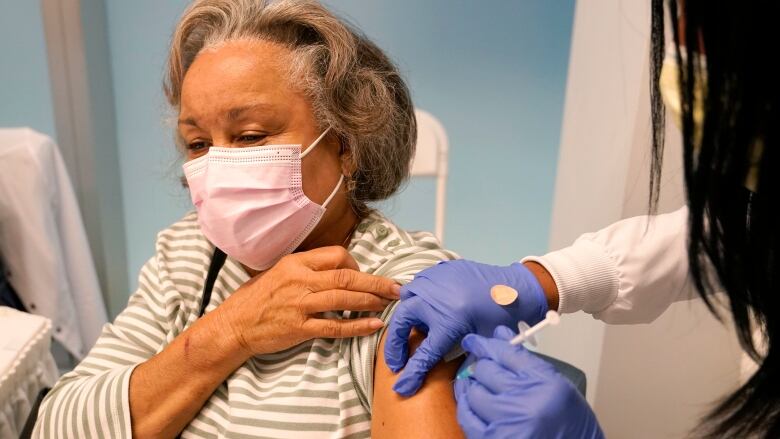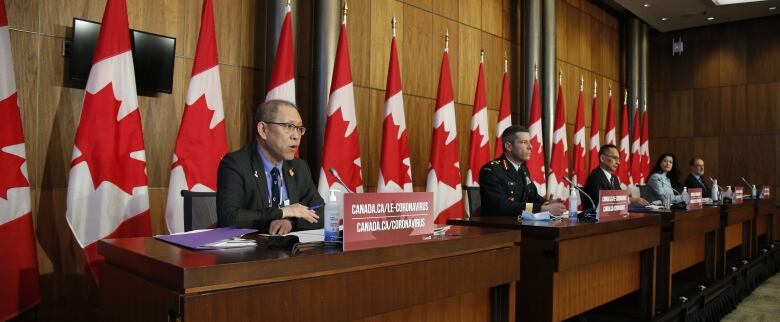Once you've been vaccinated: U.S. releases recommended dos and don'ts
Moving quickly in vaccination push, U.S. guidelines from CDC offer glimpse of a winding road ahead

This story is part ofWatchingWashington, a regular dispatch from CBC News correspondents reporting on U.S. politics and developments that affect Canadians.
Here's a glimpse of what life might look like in the nextphase of mass vaccination against COVID-19, apeek at a future where people are increasingly immune to the deadly virus.
Ahead of Canada in the sprint to vaccinate its citizens, the United States has just released its recommendations for what its newly vaccinated residents should and shouldn't change.
It's a useful roadmap for what the comingmonths might look like.
There's some good news, and less-good news, in the guidelines from the Centersfor Disease Control released Monday. Theyinclude numerous caveats, starting with a big one: these instructions apply only to people who have been fully vaccinated.
To meet that definition of being fully vaccinated, according to the CDC, means waiting two weeks after your final jab to allow the lastdoseto take effect.
Good news first
It should be fine to gather indoors, without a mask, in the presence ofother vaccinated people, two weeks after your final vaccine, the CDC said.
It's also OK to gather indoors without a mask with unvaccinated people from one other household, as long as none of those people lives with someone at increased riskbecause ofpre-existing conditions.
Here's the best news for grandparents: it means being able to see your unvaccinated grandkids, as long as they don't have an underlying condition.
If you've been vaccinated and you have been near someone infected byCOVID-19,the CDC saidthere's no need to isolate or get testedunless you also show symptoms.
If you live in a group setting, such asa nursing home, you should still isolate for 14 days and get tested if you've been near someone with COVID-19, the agency said.
The less-good news
The CDC saidthat in numerous circumstances, you should still wear a mask, avoid crowds and poorly ventilated spaces, and remain at least six feet from others.
Those circumstances include being in publicor around unvaccinated people from more than one householdor being around someone who lives with someone with increased risk.
Keep avoiding medium or large-sized gatherings, saidthe CDC.
As for travel: not so fast. The CDC urges people to delay domestic and international traveland to follow guidelines if they must travel.
Why all thosecaveats?
The CDC saidthere's still a lot we don't know about the vaccines: such as how effective they are against new variants of the virus, whether vaccinated people can transmit the virus, and how long immunity lasts.
Why it matters toCanada?

Canada's public health agency has yet to release such vaccination guidelines.
The U.S. guidance offers an early look atthe sorts of issues policy makers are grappling with as a greater number of people get vaccinated and givesCanadians an idea of the kinds of instructions they might receive.
If these new suggestions from the U.S. are any indication, the road to normalcy will be winding. Even as vaccinations ramp up, easing of restrictions will be gradual and take months.
Health Canada declined to comment on the U.S. guidelines Monday and said there's still too little data on key issues such ashow long immunity lastsand whether vaccinated people can still transmit COVID-19.
Also, travellers beware.Being vaccinated doesn't mean easier entry into Canada.
Health Canada said vaccinated travellers into Canada, enteringby air or by land, will for now still have to quarantine for 14 days and follow mandatory testing requirements.













_(720p).jpg)


 OFFICIAL HD MUSIC VIDEO.jpg)
.jpg)



























































































